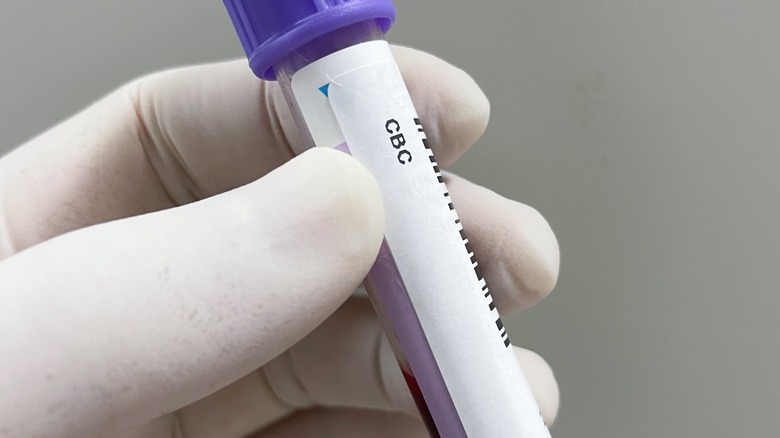What Is An RBC Count?
If a healthcare provider has ordered a red blood cell (RBC) count for you or someone you know, you may be wondering what this is and why it was ordered. According to MedlinePlus, an RBC, or erythrocyte, count is usually part of a complete blood count. A complete blood count (CBC) is one of many different types of blood tests. A CBC helps to assess the bigger picture of what is going on with your health, and is often ordered as part of a routine checkup.
As described in MedlinePlus, a CBC looks at many blood components such as white blood cell count, clotting factors such as platelets, hemoglobin (a protein in your blood responsible for carrying oxygen around your body), red blood cell (erythrocyte) count, hematocrit (a percentage of how much of your blood is made up of red blood cells), and mean corpuscular volume (the size of red blood cells).
MedlinePlus explains that an RBC count, in particular, may be used to help diagnose disorders specifically related to red blood cells. As the name implies, the RBC count measures your number of red blood cells.
Why they're ordered
According to Johns Hopkins Medicine, red blood cells contain the protein hemoglobin. Hemoglobin plays an important role in your body by carrying oxygen around. So, checking to ensure your body has the right amount of red blood cells is important.
MedlinePlus explains the symptoms and problems that can arise from abnormal levels of red blood cells. Too high of a red blood cell count can lead to headaches, dizziness, and vision problems. Too few red blood cells can lead to weakness, fatigue, pale skin, and a rapid heartbeat.
If your red blood cell count is outside the normal range, whether too high or too low, there are many possible explanations, ranging from simple to treat to more serious causes. Per MedlinePlus, too high of a red blood cell count can be associated with dehydration, heart disease, lung problems, bone marrow disease, or kidney cancer, among other causes. Conversely, too low of a red blood cell count can be associated with anemia, leukemia, malnutrition, kidney failure, and cancer of the bone marrow.
MedlinePlus adds that an abnormal RBC count is often among the first signs of illness. Therefore, an RBC count may allow you to seek treatment even before symptoms emerge.
Many of these possible causes and symptoms may sound scary. If you are concerned about your red blood cell count, your healthcare provider can provide you with additional information and discuss whether or not you should be seen.


